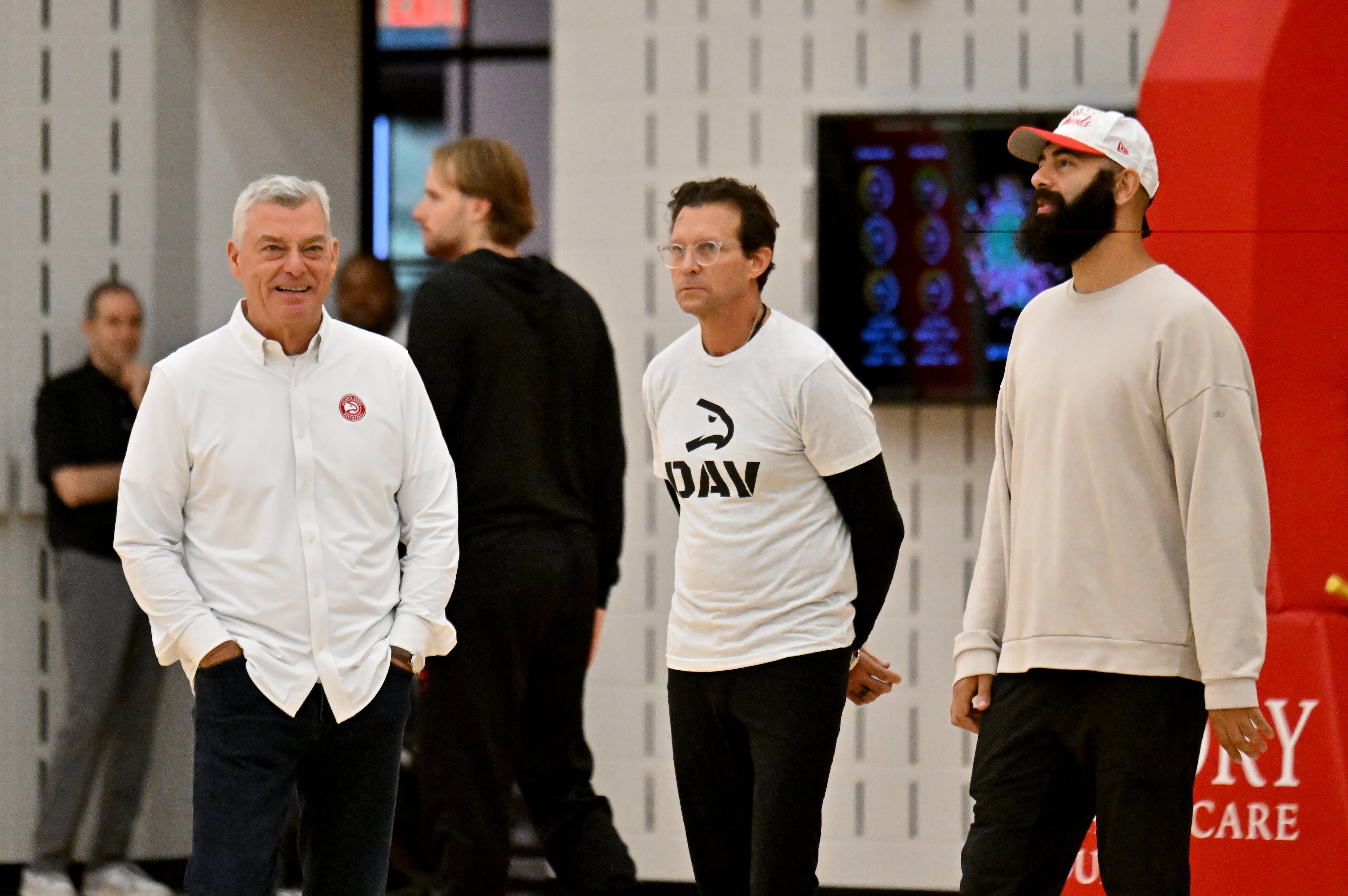Keeping these Hawks together at deadline makes little sense

Here is the optimistic viewpoint of the Hawks at the All-Star break: Despite letting Al Horford go, despite replacing him with Dwight Howard, despite dealing Kyle Korver last month, despite fielding a team considered so uninteresting that average home (announced) attendance has dropped by 1,000 from last season and 1,500 from two years ago, they are on pace to finish with about the same regular-season record as a year ago.
That’s the best-case scenario. Because while the Hawks are 32-24 and theoretically can host a first-round playoff series, they have a negative point differential, they’ve been a tick above a .500 team (23-22) since opening 9-2 and — perhaps most important — there seems little to point to and think, “There’s a building block for the future.”
Not surprisingly, Mike Budenholzer painted a rosier picture. He said “nobody envisioned” a stretch when the Hawks lost 10 of 11 games and, repeating my description of his team used in a question, said, “I believe we’re better than a tick over a .500 team. You need to be honest with yourself and be self-critical and, yes, we’d like to be better and more consistent on a nightly basis. But I think we’re a good team that has shown it can compete at a high level.”
They have had some good wins: Cleveland, Oklahoma City, Houston twice. But they’ve had too many embarrassing nights: losses to Toronto by 44, Washington by 26, Detroit by 36, Utah by 27 and 25. There’s little sense of building or trending upward, which is not a good sign with two-thirds of the season gone.
Budenholzer long ago proved himself as a head coach. He is not proven as a front-office executive. Credit him for acquiring Tim Hardaway Jr. in a deal criticized by many and developing the guard into a solid player and legitimate perimeter weapon. But otherwise, his “plus” column in transactions is thin.
Only one starter (Paul Millsap) remains from the team that went to the Eastern Conference finals two years ago. Budenholzer reaffirmed he will hold onto Millsap at the NBA trade deadline. I have a question: Why?
Millsap is the Hawks’ best player, he loves playing for Budenholzer and he said he wants to stay in Atlanta (just like Horford). But he’s 32 years old, and he is going to opt out of his contract after the season, which means he’ll be fielding offers from other teams, including contenders. The Hawks are running the risk of losing a four-time All-Star for nothing (also like Horford), or they’ll have to pay him more than he’s realistically worth at his age to keep him. If Horford (two years younger) wasn’t worth going to the wall for, is Millsap?
Based on youth, talent and contract, the Hawks have one player to potentially build around: point guard Dennis Schroder. If rookies Taurean Prince and DeAndre Bembry develop, there’s two more. But they’re unproven commodities.
Only six players are under contract for next season: Howard, Schroder, Prince, Bembry, Kent Bazemore and Malcolm Delaney. Hardaway is a restricted free agent and could get offered more than the Hawks want to pay. There are five unrestricted free agents, including Thabo Sefolosha, which is why he remains a candidate to go before the deadline. This roster could be bludgeoned after the season.
The Hawks surely will make the playoffs, but they’re unlikely to make a dent when they get there. There are far better teams in the East: Cleveland (even with injuries), Boston (11-2 going into the break and possibly better than Cleveland), Washington (which has won 18 of 21 and 27 of 35) and even skidding Toronto.
There are big-picture decisions that need to be made — but the biggest will be by majority owner Tony Ressler, not Budenholzer.
Ressler is the organization’s principal decision-maker and, as such, is evaluating the moves (and non-moves) of Budenholzer and general manager Wes Wilcox. Ressler has done some good things in his early tenure, negotiating deals for a practice facility, a major renovation of Philips Arena and a D-League team. He’s competitive. He cares. He’s way ahead of the cartoon ownership group that preceded him. But improvement of the product may depend on his ability to improve the front office and bring in somebody with vision.
Budenholzer praised Ressler and said of their relationship, “I think we’re in a great place. We’re still relatively new to each other, but I think we have a better understanding of each other and of the NBA. There are a lot of teams at a similar level to us.”
But that’s not necessarily a good thing. They rank 20th in offense and often not good enough on defense to make up for that (10th overall, but allowing the fourth-most 3-pointers in the league at 10.7 per game).
They certainly aren’t the bunch that rolled to 60 wins and the conference finals two years ago when, for a moment, the Hawks were Atlanta’s “it” team. Keeping this core intact at the deadline seems to make little sense.


